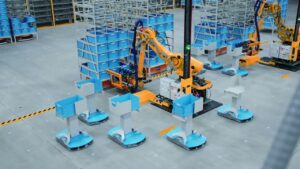
In this briefing, we take a moment to explore artificial intelligence and how it has helped and hindered eCommerce brands. Will Haire writes this month’s edition.
Exploring The Future Of eCommerce: Artificial Intelligence and Its Impact on eCommerce
Artificial Intelligence (AI) has revolutionized the eCommerce industry in recent years, and its impact is being felt by online sellers. Currently, AI plays the role of bettering customer experiences and innovative solutions such as product recommendations, personalized shopping experiences, virtual assistance, inventory management, chatbots, and voice search. For sellers on marketplaces like Amazon, leveraging AI can mean the difference between success and failure. In this article, we’ll explore the ways in which AI is transforming eCommerce, its impact on sellers on marketplaces like Amazon, and best practices for leveraging AI to drive growth and success in eCommerce.
AI is Transforming eCommerce
Artificial Intelligence is transforming eCommerce in numerous ways, improving efficiency, and enhancing the customer experience. Here are some of the ways AI is transforming eCommerce:
AI-Powered Product Recommendations
Product recommendations is one of the most significant ways that AI is improving shopping experiences online. AI algorithms, like Google or Amazon, have the ability to analyze vast amounts of data, including purchase history, browsing behavior, and search queries, to provide the best recommendations to online shoppers. Amazon’s algorithm selects recommended products for each user based on their previous purchases, interactions, and ratings of other items on display and combines them with similar items viewed by users with similar preferences and interests.

A recent study by McKinsey & Company found that personalized recommendations could drive up to 40% of revenue for eCommerce brands. While an Accenture study sites that up to 91% of online shoppers admit that they are more likely to use a brand’s offer that personalizes their experience. AI-powered recommendations work to give shoppers a more customized experience and lead to better engagement and sales for online shoppers.
AI-Powered Customer Service
Customer service is increasingly becoming an AI-driven solution with functions such as chatbots or digital assistance providing 24/7 customer service. AI can provide a variety of solutions in this area by providing answers to customer questions about product specifications, order tracking, and general customer service. The technology continues to improve as we are seeing improvements in capabilities around Natural Language Processing (NLP), self-learning capabilities to improve over time, and personalized offers to shoppers. Amazon has made incredible advancements in utilizing chatbot technology for customer service. It leverages a template ranker where an AI model controls the chatbot’s vocabulary by choosing among hand-authored response templates. The templates contain variables for product names, delivery timelines, dates, prices, and more.

Servion Global Solutions has predicted that by 2025, 95% of customer interactions will be powered by AI. Gartner predicts by 2027, and chatbots will be the primary customer service channel for roughly a quarter of organizations. One thing is clear, chatbots and digital virtual assistants are here to stay. Hopefully, this means less hold music and more help.
AI-powered Inventory Management
Inventory management helps eCommerce brands improve operational efficiency, reduce cost and avoid stockouts. AI can analyze variables that affect inventory stock levels, predict scenarios and recommend solutions better than any human method. Here is a list of the top ways AI is enhancing inventory management;
- Automating Material Procurement: According to McKinsey, companies that introduced AI into their procurement process have reported a 15% reduction in logistic costs and a 35% improvement in inventory levels. Automation in procurement includes procurement spend classifications, vendor matching, collecting market and supplier data, and detecting data anomalies.
- Minimize Downtime Through Predictive Analytics: Predictive analytics allows eCommerce brands to be more data-driven in their approach to handling inventory. These decisions allow brands to find more cost-effective solutions, detect failures and data anomalies earlier and reduce downtime when problems occur.
- Improved Warehouse Management: By streamlining and optimizing the warehousing management processes lessens the chance for human error while allowing workers to focus on better quality control and assurance standards. Good AI systems can clearly communicate accurate information quicker, optimize the logistical components, and optimize inventory on shelves.
- Demand Forecasting: AI-enhanced inventory management systems can better measure demand patterns and use all types of available data to forecast and optimize warehouse replenishment plans accurately.

Amazon AI Management System; Flywheel
Amazon is an early adopter of AI and Machine Learning which spills into all silos of the Amazon business. From warehouses and fulfillment centers to your Echo speaker, Amazon has been leveraging these technologies to drive internal processes efficiency and improve the customer experience. “Flywheel” is an engineering concept that describes the way businesses can conserve energy and keep up momentum. The flywheel maintains a constant flow of energy, spreading it to other areas of a machine. Amazon has been investing in the following areas to enhance the customer experience and to apply the flywheel approach.
- Chatbots: Amazon continues to innovate on the customer service side but also stores data and interactions to build out different scenarios all with the purpose of improving efficiency and enhancing the customer experience.
- Product Recommendations: Product recommendations can be seen on every page, channel, and Amazon device. Research shows that 45 different recommendation widgets are visible on the app homepage alone, representing Amazon’s devotion to promoting product discovery.
- Alexa-Based Voice Shopping: With the help of a voice-activated virtual assistant, users can search for and buy items on their mobile devices without having to touch the screen; the checkout process is guided entirely by voice prompts.
- Product Forecasting: Amazon has made advancements in the areas of image recognition, deep learning, and natural language processing to develop forecasting models that assist in making precise decisions across a range of product categories.
- Warehouse and Delivery Optimization: AI technology now enables Amazon employees at fulfillment centers to bypass manual item scanning. Warehouse workers can use a barcode scanner to scan an item, place it on a shelf, and then scan the shelf itself. This dual scanning process associates the product with its location. Moreover, Amazon’s fulfillment centers are equipped with smart robots.

It is clear that AI is playing a significant role in improving the overall efficiency of the industry as well as the shopping experience. The role that brands play in adopting these technologies and applying them to their Direct-to-consumer strategies will be the driving force behind growth. AI will soon completely take over customer service, applications around warehousing and inventory management, and creating custom shopping experiences. The advantages of gaining insights from shopping data and then breaking it down to be further enhanced with AI in order to create custom experiences tied to the interests and tastes of each one of your brand shoppers. With the help of AI and data collected from online shoppers and businesses, brands can make informed decisions by using that data more efficiently to forecast future results and adjust their marketing strategies accordingly.
Sources:
- https://fashionunited.com/news/retail/how-ai-is-transforming-e-commerce/2022033146854
- https://www.mckinsey.com/capabilities/growth-marketing-and-sales/our-insights/the-value-of-getting-personalization-right-or-wrong-is-multiplying
- https://www.accenture.com/_acnmedia/pdf-77/accenture-pulse-survey.pdf
- https://servion.com/blog/what-emerging-technologies-future-customer-experience/
- https://venturebeat.com/ai/amazon-tests-ai-powered-customer-support-agents-on-amazon-com/
- https://www.mckinsey.com/industries/metals-and-mining/our-insights/succeeding-in-the-ai-supply-chain-revolution
- https://www.dynamicyield.com/article/amazon-recommendations/
- https://www.liquidweb.com/blog/ai-inventory-management/
- https://www.aboutamazon.com/news/operations/10-years-of-amazon-robotics-how-robots-help-sort-packages-move-product-and-improve-safety
Keep up with the latest Amazon and Walmart news updates and subscribe to our BellaVix newsletter 👇👇👇
